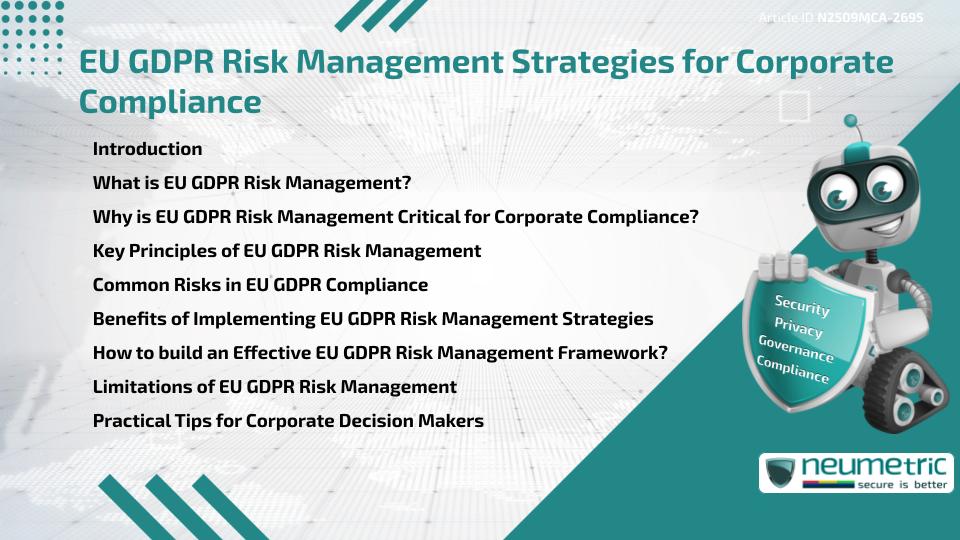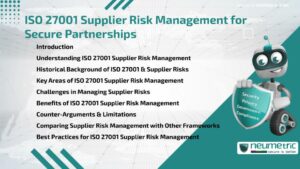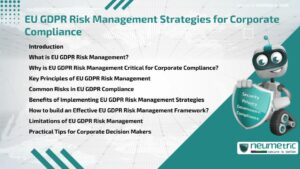Table of Contents
ToggleIntroduction
The EU GDPR Risk Management process is essential for Organisations that collect, process or store Personal Data of individuals within the European Union. With the General Data Protection Regulation [GDPR], businesses must adopt strategies to identify Risks, protect Sensitive Information & demonstrate Accountability. Failure to comply can lead to hefty fines, reputational harm & legal consequences. For corporate leaders, EU GDPR Risk Management is not just about avoiding penalties but also about building Trust & strengthening Compliance Culture. This article explores what it means, why it matters & how Organisations can implement effective strategies.
What is EU GDPR Risk Management?
EU GDPR Risk Management is the practice of assessing, monitoring & mitigating Risks associated with the processing of Personal Data under GDPR guidelines. It involves identifying Potential Threats to Data Protection, evaluating their impact & applying safeguards to ensure Compliance.
Unlike general Data Security practices, this approach is specifically tied to GDPR requirements such as Data Minimisation, Consent Management & Rights of individuals. It also emphasises the importance of Documenting decisions & demonstrating Compliance to Regulators.
Why is EU GDPR Risk Management Critical for Corporate Compliance?
Corporate Compliance depends on an organisation’s ability to meet Legal & Regulatory requirements. The EU GDPR Risk Management process ensures that companies adhere to GDPR principles while embedding Accountability across operations.
For businesses operating in or serving EU citizens, the stakes are high. Non-Compliance can result in fines of up to four percent (4%) of annual global turnover or twenty (20) million EUros, whichever is higher. Beyond Financial impact, reputational damage can erode Customer Trust & Investor confidence.
Key Principles of EU GDPR Risk Management
Effective EU GDPR Risk Management is based on several principles:
- Data Minimisation: Collecting only the data that is strictly necessary.
- Accountability: Demonstrating Compliance through Documentation & Reporting.
- Transparency: Clearly informing individuals about data collection & usage.
- Risk-Based Approach: Prioritising safeguards based on the level of Risk to individuals.
- Privacy by Design & by Default: Embedding Data Protection measures into systems & processes from the outset.
These principles help Organisations stay aligned with both the letter & spirit of GDPR.
Common Risks in EU GDPR Compliance
Organisations often face recurring Risks, including:
- Inadequate Consent Management Practices.
- Weak Controls around Data Access & Sharing.
- Insufficient mechanisms for responding to Data Subject requests.
- Poor Vendor & Third Party Risk Management.
- Failure to report Data Breaches within seventy-two (72) hours.
Recognising these Risks allows organisations to focus resources on areas of greatest Vulnerability.
Benefits of Implementing EU GDPR Risk Management Strategies
Applying effective EU GDPR Risk Management strategies delivers multiple benefits:
- Reduces exposure to Regulatory fines & Legal actions.
- Enhances Trust with Customers, Investors & Regulators.
- Improves data Governance & Operational Efficiency.
- Builds a proactive culture of Compliance & Accountability.
- Strengthens competitive advantage in markets where Privacy is valued.
How to build an Effective EU GDPR Risk Management Framework?
An effective Framework typically includes:
- Risk Identification: Mapping data flows & identifying Vulnerabilities.
- Impact Assessment: Conducting Data Protection Impact Assessments [DPIAs] for high-Risk activities.
- Control Implementation: Applying Encryption, Access Management & Monitoring Tools.
- Vendor Oversight: Ensuring Third Parties also comply with GDPR obligations.
- Training & Awareness: Educating Employees on GDPR principles & responsibilities.
- Continuous Monitoring: Regularly reviewing & updating practices as Risks evolve.
This structured approach ensures that Compliance is sustainable & auditable.
Limitations of EU GDPR Risk Management
While critical, EU GDPR Risk Management has limitations. It cannot eliminate all Risks, as new Threats emerge constantly. The effectiveness of strategies depends heavily on Employee Awareness, Leadership commitment & Resource allocation. Additionally, global Organisations face the challenge of harmonising GDPR Compliance with other regional Data Protection laws.
Practical Tips for Corporate Decision Makers
- Treat GDPR Compliance as an ongoing journey, not a one-time project.
- Appoint a Data Protection Officer [DPO] where required.
- Regularly update Policies & Procedures.
- Engage Legal & Cybersecurity experts for specialised advice.
- Foster a culture where Data Protection is everyone’s responsibility.
Takeaways
- Ensures Compliance with GDPR legal obligations.
- Reduces financial, legal & reputational Risks.
- Builds Trust with Customers & Stakeholders.
- Requires a structured, Risk-based approach.
- Must be maintained through Continuous Monitoring & Improvement.
FAQ
What is the purpose of EU GDPR Risk Management?
It helps Organisations identify, assess & mitigate Data Protection Risks to comply with GDPR requirements.
Is EU GDPR Risk Management mandatory?
Yes, GDPR requires Organisations to adopt a Risk-based approach & conduct impact assessments for high-Risk activities.
What are the most common GDPR Compliance Risks?
Common Risks include poor Consent Management, weak Access Controls & failure to report Breaches promptly.
Who is responsible for EU GDPR Risk Management in a company?
Typically, responsibility lies with the Data Protection Officer, Compliance teams & executive Leadership.
How often should EU GDPR Risk Management be reviewed?
It should be reviewed at least annually & whenever major business or system changes occur.
Does EU GDPR Risk Management apply to non-EU companies?
Yes, any company processing Personal Data of EU residents must comply, regardless of its physical location.
How does EU GDPR Risk Management benefit businesses?
It reduces Compliance Risks, enhances Reputation & strengthens Customer Trust.
Need help for Security, Privacy, Governance & VAPT?
Neumetric provides organisations the necessary help to achieve their Cybersecurity, Compliance, Governance, Privacy, Certifications & Pentesting needs.
Organisations & Businesses, specifically those which provide SaaS & AI Solutions in the Fintech, BFSI & other regulated sectors, usually need a Cybersecurity Partner for meeting & maintaining the ongoing Security & Privacy needs & requirements of their Enterprise Clients & Privacy conscious Customers.
SOC 2, ISO 27001, ISO 42001, NIST, HIPAA, HECVAT, EU GDPR are some of the Frameworks that are served by Fusion – a SaaS, multimodular, multitenant, centralised, automated, Cybersecurity & Compliance Management system.
Neumetric also provides Expert Services for technical security which covers VAPT for Web Applications, APIs, iOS & Android Mobile Apps, Security Testing for AWS & other Cloud Environments & Cloud Infrastructure & other similar scopes.
Reach out to us by Email or filling out the Contact Form…





